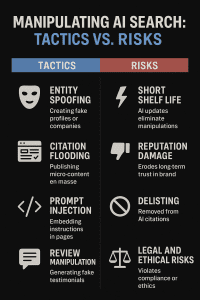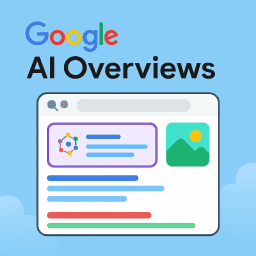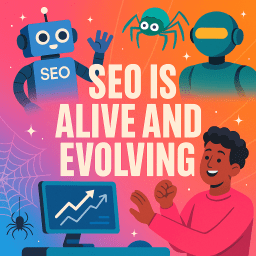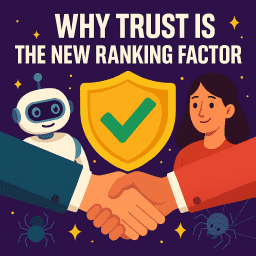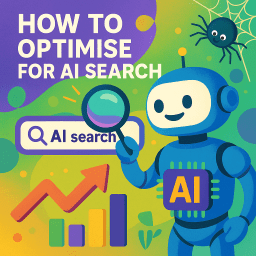The Ethical Edge: Manipulating AI Search and SEO Risks
A provocative look at the grey areas of AI SEO.
⚖️ The Temptation to Cheat AI Search
Every new technology creates a temptation to exploit it. When Google first rose to dominance, SEOs experimented with keyword stuffing, link farms, and cloaking. Some got results, most were eventually penalised. Now with AI-driven search engines like Google Gemini, Perplexity, and ChatGPT Search, the question arises again: can you manipulate AI search without getting caught?
It’s a provocative question – and the answer is complicated. While there are tactics that can temporarily influence AI results, history shows us that trust and authority always win long-term. Let’s explore where the grey areas lie.
How AI Decides Trust
Unlike traditional search, AI engines rely heavily on credibility and entity validation. They are risk-averse: better to cite no source than the wrong one. Trust is built from:
- Reputation graphs: Who you’re connected to (partners, citations, reviews).
- Consistency: Whether your facts align across the web.
- Transparency: Author bios, credentials, and clear ownership.
- Freshness: Up-to-date information, especially in fast-moving niches.
Possible Manipulation Tactics
Some SEOs are already testing ways to “nudge” AI into citing their content. These include:
- Entity spoofing: Creating fake profiles, companies, or authors to pad reputation graphs.
- Citation flooding: Publishing thousands of micro-content pages to appear everywhere AI scrapes.
- Prompt injection: Trying to manipulate AI answers by embedding instructions in web pages.
- Review manipulation: Fake testimonials to boost credibility signals.
While these may work briefly, AI retraining cycles and model updates tend to flush out manipulation attempts quickly.
The Risks of Gaming AI Search
- Short shelf life: What works today may vanish tomorrow after the next AI update.
- Reputation damage: If manipulation is exposed, your brand loses long-term trust with both AI and users.
- Delisting: Being flagged as untrustworthy can remove you from AI citation pools entirely.
- Legal and ethical risks: Misrepresentation can create compliance issues in regulated industries.
Lessons from Early SEO
The early days of Google SEO were filled with grey-hat tactics: hidden text, keyword stuffing, and link farms. Many businesses enjoyed short-term gains but lost everything when penalties rolled out. The same dynamic applies to AI search. Manipulation may provide a temporary boost, but long-term visibility depends on credibility, not shortcuts.
Ethical Alternatives to Manipulation
If you’re tempted to “game” AI, here are smarter – and safer – alternatives:
- Build reputation graphs: Earn citations from reputable directories, press, and associations.
- Leverage structured data: Make your content machine-readable with schema.
- Be transparent: Use author bios, clear contact info, and verifiable claims.
- Publish AI-friendly content: Use FAQs, conversational language, and up-to-date facts AI can easily surface.
- Play the long game: Trust signals compound over time and make your site “stickier” in AI training data.
“Manipulation might win you a sprint, but trust wins the marathon. AI search is built to filter risk – if you’re credible, you’ll keep getting cited.” – David Roche
What the Experts Are Saying
- “AI search is harder to game than Google ever was. Reputation and credibility are everything.” – Lily Ray
- “We’ll see the same pattern we saw with link schemes — short-term wins, long-term losses.” – Rand Fishkin
- “The smartest SEOs are asking: how do we earn AI trust, not how do we trick it.” – Aleyda Solís
Final Thoughts
The question of whether you can manipulate AI search without being caught is provocative – and yes, it may be possible in the short term. But history has shown that gaming algorithms always ends the same way: with penalties, lost visibility, and damaged reputations.
The ethical edge isn’t about finding loopholes; it’s about being the most transparent, consistent, and credible source available. AI search engines are built to reduce risk, and that means rewarding trust above everything else. If you focus on building a strong reputation graph and clear trust signals, you won’t just survive in AI search – you’ll thrive.
Frequently Asked Questions
Can you manipulate AI search engines like Google Gemini?
It’s possible to influence them temporarily, but AI retraining cycles usually eliminate manipulative tactics quickly.
What are the risks of trying to game AI search?
Risks include losing visibility, damaging your brand, being de-listed from AI citations, and even compliance issues in regulated industries.
What is entity spoofing in AI SEO?
Entity spoofing is creating fake profiles or companies to trick AI into believing they are authoritative connections.
Does prompt injection work in AI SEO?
Some experiments show temporary influence, but search engines are improving at detecting and blocking it.
How is AI SEO different from old-school manipulation?
AI search is more risk-averse and citation-based, making it harder to game than early Google SEO.
What should businesses do instead of manipulating AI?
Focus on trust-building: schema, reviews, directories, press mentions, and transparent authorship.
Do fake reviews help in AI SEO?
Fake reviews may work briefly, but they carry serious risks if discovered, including loss of trust and visibility.
Will AI penalties be harsher than Google’s?
Yes, because AI search prioritises safety. Being flagged as untrustworthy could mean long-term exclusion.
Can small businesses still win in AI SEO without manipulation?
Yes — SMEs can win by being agile, building reputation graphs, and publishing credible, structured content.
Is AI SEO about trust more than keywords?
Yes. Keywords matter, but trust signals and reputation graphs now dominate AI visibility.
Video Recap – Manipulating AI Search: The Ethics of Gaming Generative Engines
Everyone’s trying to figure out how to beat AI search. But what if the question isn’t how far you can push it – it’s whether you should? In this video, we dive into the ethics of manipulating AI-driven results, the hidden risks behind Generative Engine Optimisation, and why the future of search might depend on doing the right thing – not just ranking first.”



